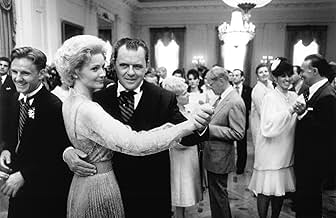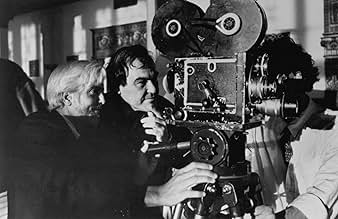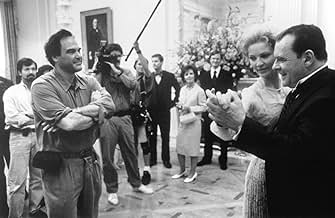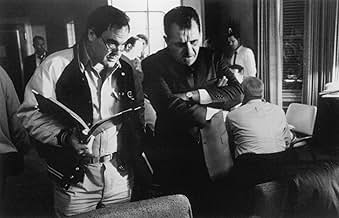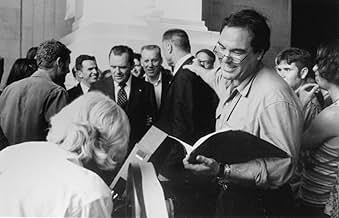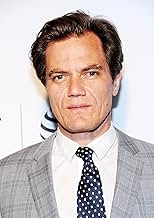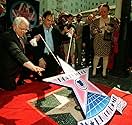Biografía del expresidente estadounidense Richard Nixon, desde sus días de niño hasta su eventual presidencia, que terminó en vergüenza.Biografía del expresidente estadounidense Richard Nixon, desde sus días de niño hasta su eventual presidencia, que terminó en vergüenza.Biografía del expresidente estadounidense Richard Nixon, desde sus días de niño hasta su eventual presidencia, que terminó en vergüenza.
- Dirección
- Guionistas
- Elenco
- Nominado a 4 premios Óscar
- 11 premios ganados y 18 nominaciones en total
- Dirección
- Guionistas
- Todo el elenco y el equipo
- Producción, taquilla y más en IMDbPro
Opiniones destacadas
Oliver Stone has a way of making films that grab you and hold you until the final frame. His films are usually controversial and that's what generates much debate and Nixon is no exception. Anthony Hopkins assumes the mantle of Richard M. Nixon and he does it with style. His Nixon is a complex man, full of ambition and dreams, but also filled with demons. Nixon lives in the shadow of JFK, and because of that, he feels he can never live up to the greatness that he aspires to. Joan Allen is equally convincing as Pat Nixon. She is a strong woman who loves her husband, but unlike Nixon, she grows tired of the political world. The film works best when we see the inner workings of the Nixon Whitehouse. We see the coverup of the Watergate break in. We see Nixon's historic visit to China and we see the final farewell of a flawed, but ambitious man. It's hard to cram an entire lifetime into a three hour film, but Stone manages to do it well. We get brief glimpses into Nixon's past and we see the events that eventually undid him. Some may say that Nixon is painted in an unfair light. I think Stone actually sympathizes with him. Here was a man who came into power in the middle of a war. He was feared by many and misunderstood by all. Nixon was able to rise above it all for a short period of time, and in that brief period, he did have the world.
Hopkins is remarkable as Nixon. Wisely not even trying for an exact likeness, his interpretation of that so-familiar physicality is uncannily evocative. From the very start, the characterisation is spot-on - the jut of the lower jaw, the growly voice, the rounded shoulders. Once the viewer has adjusted to the initial shock, Hopkins IS Nixon. It ceases to be an issue.
Theodore Roosevelt, Washington, Kennedy and (most of all) Lincoln look down from the White House walls at Nixon, their solemn portraits hovering like admonishing ghosts over the Watergate squalor. In life, Roosevelt was bold and self-assured, whereas Nixon dithers: Washington's self-effacing propriety confronts a Nixon who is suggesting that the Nazis were right. Kennedy is everything that Nixon could never be - above all else, at ease with himself. Lincoln looks down, from the office wall and from his marble seat in the Memorial, in silent rebuke as his successor debases the presidency.
Some of the camera tricks don't work. We see Nixon rooted to the spot at Love Field as the camera soars up and away from him. Why? Obtrusive camera movement is justified only if it adds to our understanding of character or plot. This shot seems to have been included merely for its cleverness. The same is true of the little flashes of black-and-white which keep interrupting the action. At one point, in a dialogue between Nixon and Haldeman, the focus is un-subtly and repeatedly thrown from one man to the other. What does this achieve? Is some artistic goal being pursued, or are the effects included for their own sake? What is the symbolic importance (if any) of the vanishing racehorses?
Much of the attention to detail is of a very high order. Stone's writing team has done its homework, and we get authentic touches such as Nixon's love of log fires, which meant having to run the White House air conditioning system at full blast during summer. The reconstructions of the White House interiors are superb. We see Nixon and Pat engaging in a domestic scrap beneath murals of more edifying battles like Yorktown and Saratoga. Historical events, recorded on news film at the time, are brilliantly reconstituted, replacing the real Nixon with the Hopkins version. Thus we get convincing reconstructions of the Kennedy TV debate and the 1962 'retirement' speech. Young Nixon's courtship of Pat is narrated without dialogue as a grainy, jumpy home movie - and is beautifully done. I did not feel quite so positive about the Alger Hiss segment. Welles did this 'newsreel flashback' idea in "Citizen Kane" more than half a century earlier, and did it with such flair that anything which follows is sure to look jaded. It also seemed to me that this passage is badly-placed, coming immediately after the 1962 California defeat.
James Wood plays Bob Haldeman, and does his usual admirable, photogenic best. My quibble with the characterisation is, this isn't THE Haldeman. The historical personage was grimmer, more stately, more formidable (Fred Emery's "Watergate" bears this out). Wood is restricted here to the role of an aide, rather than the Chief of the White House Staff, an emperor within his own (not inconsiderable) domain.
Pat Nixon does not ring true either, but for different reasons. Joan Allen is more than competent as the steely, astute power behind the Nixon throne. The fault is in the characterisation rather than the actor. The real Pat was (so far as one can judge) an altogether less articulate, less philosophical, less knowing individual. Watch her in the REAL "Checkers" broadcast - she is a stiff, repressed, passive woman, a true 1950's Republican wife, not the power broker that this film would have us believe. It is hard to accept, for example, that Nixon's decision to retire in 1962 was his wife's diktat.
There are elements of this otherwise excellent film which simply don't work. Would the President of the United States REALLY be pulled out of a face-to-face meeting with Brezhnev to deal with some Watergate minutiae? The real-life Mitchell said that he tolerated Martha's indiscretions "because I love her". This touching declaration is cheapened in the film, for no good reason. Similarly, Tricia Nixon's exchange with her father was, in real life, an assertion of unconditional loyalty which was both moving and very much to Nixon's credit. The film version has her asking sceptically, "Did you cover up?" This is quite wrong. The Nixon women would have considered it treachery even to frame such a question.
John Williams' epic score is in keeping with the classical tragedy acted out before us. Nixon's tearful prayer with Kissinger and the farewell speech to the White House staff are scenes of extraordinary power.
Paul Sorvino gives us a marvellous Kissinger, though in my humble opinion Stone goes too far when he makes Kissinger the White House 'leaker' and accuses the Secretary of State of complicity in the Watergate break-ins.
One scene which works splendidly is the (true) incident at the Lincoln Memorial. Nixon tries to glad-hand the indignant youngsters, using the hearty, patronising approach of a bygone generation. The sad revulsion of the protesters shows the gulf between Nixon's consciousness and the spirit of the age.
"I hope I haven't let you down" is uttered one single time by Nixon, towards the end of the film. The truth is, he hit on this formula of words and used it again and again during the final days of his presidency. It was a last desperate attempt to tweak our sympathy-nodes. As such, it was utterly gauche, utterly craven, utterly guileful, yet utterly unrealistic. In fact, utterly Nixon.
Theodore Roosevelt, Washington, Kennedy and (most of all) Lincoln look down from the White House walls at Nixon, their solemn portraits hovering like admonishing ghosts over the Watergate squalor. In life, Roosevelt was bold and self-assured, whereas Nixon dithers: Washington's self-effacing propriety confronts a Nixon who is suggesting that the Nazis were right. Kennedy is everything that Nixon could never be - above all else, at ease with himself. Lincoln looks down, from the office wall and from his marble seat in the Memorial, in silent rebuke as his successor debases the presidency.
Some of the camera tricks don't work. We see Nixon rooted to the spot at Love Field as the camera soars up and away from him. Why? Obtrusive camera movement is justified only if it adds to our understanding of character or plot. This shot seems to have been included merely for its cleverness. The same is true of the little flashes of black-and-white which keep interrupting the action. At one point, in a dialogue between Nixon and Haldeman, the focus is un-subtly and repeatedly thrown from one man to the other. What does this achieve? Is some artistic goal being pursued, or are the effects included for their own sake? What is the symbolic importance (if any) of the vanishing racehorses?
Much of the attention to detail is of a very high order. Stone's writing team has done its homework, and we get authentic touches such as Nixon's love of log fires, which meant having to run the White House air conditioning system at full blast during summer. The reconstructions of the White House interiors are superb. We see Nixon and Pat engaging in a domestic scrap beneath murals of more edifying battles like Yorktown and Saratoga. Historical events, recorded on news film at the time, are brilliantly reconstituted, replacing the real Nixon with the Hopkins version. Thus we get convincing reconstructions of the Kennedy TV debate and the 1962 'retirement' speech. Young Nixon's courtship of Pat is narrated without dialogue as a grainy, jumpy home movie - and is beautifully done. I did not feel quite so positive about the Alger Hiss segment. Welles did this 'newsreel flashback' idea in "Citizen Kane" more than half a century earlier, and did it with such flair that anything which follows is sure to look jaded. It also seemed to me that this passage is badly-placed, coming immediately after the 1962 California defeat.
James Wood plays Bob Haldeman, and does his usual admirable, photogenic best. My quibble with the characterisation is, this isn't THE Haldeman. The historical personage was grimmer, more stately, more formidable (Fred Emery's "Watergate" bears this out). Wood is restricted here to the role of an aide, rather than the Chief of the White House Staff, an emperor within his own (not inconsiderable) domain.
Pat Nixon does not ring true either, but for different reasons. Joan Allen is more than competent as the steely, astute power behind the Nixon throne. The fault is in the characterisation rather than the actor. The real Pat was (so far as one can judge) an altogether less articulate, less philosophical, less knowing individual. Watch her in the REAL "Checkers" broadcast - she is a stiff, repressed, passive woman, a true 1950's Republican wife, not the power broker that this film would have us believe. It is hard to accept, for example, that Nixon's decision to retire in 1962 was his wife's diktat.
There are elements of this otherwise excellent film which simply don't work. Would the President of the United States REALLY be pulled out of a face-to-face meeting with Brezhnev to deal with some Watergate minutiae? The real-life Mitchell said that he tolerated Martha's indiscretions "because I love her". This touching declaration is cheapened in the film, for no good reason. Similarly, Tricia Nixon's exchange with her father was, in real life, an assertion of unconditional loyalty which was both moving and very much to Nixon's credit. The film version has her asking sceptically, "Did you cover up?" This is quite wrong. The Nixon women would have considered it treachery even to frame such a question.
John Williams' epic score is in keeping with the classical tragedy acted out before us. Nixon's tearful prayer with Kissinger and the farewell speech to the White House staff are scenes of extraordinary power.
Paul Sorvino gives us a marvellous Kissinger, though in my humble opinion Stone goes too far when he makes Kissinger the White House 'leaker' and accuses the Secretary of State of complicity in the Watergate break-ins.
One scene which works splendidly is the (true) incident at the Lincoln Memorial. Nixon tries to glad-hand the indignant youngsters, using the hearty, patronising approach of a bygone generation. The sad revulsion of the protesters shows the gulf between Nixon's consciousness and the spirit of the age.
"I hope I haven't let you down" is uttered one single time by Nixon, towards the end of the film. The truth is, he hit on this formula of words and used it again and again during the final days of his presidency. It was a last desperate attempt to tweak our sympathy-nodes. As such, it was utterly gauche, utterly craven, utterly guileful, yet utterly unrealistic. In fact, utterly Nixon.
This is a scary one. A merciless look into the pathology of one weird bloke. Anthony Hopkins may not look like Nixon but he does the role to perfection. It is truly scary.
Great cast. Hopkins is a hard working star. What a shame he lost to the Hoffman aper Cage. And Nixon? What a loser. What a terrible insufferable tragic loser. It surely was a challenge to do this for Hopkins.
The biggest most significant detriment is of course one knows not where fact ends and fiction begins. Stone doesn't exactly have a reputation for avoiding hyperbole.
But taken as a personality portrait it's devastating. You might know your history but you've probably never imagined things were like this. You could have imagined them if you'd taken the time, but this movie brings you there.
It's just a tragic movie about an extraordinarily tragic figure. Stone brought you Salvador where he showed how well he knows the art of movie making; he brought you the screenplay for Scarface; and so forth. He can do it, whether or not he goes too far on some occasions. The movie production itself is very good.
And it's a long one. It's not a popcorn movie. It's extremely depressing and frightful. A look into one very weird pathology. But a 7 out of 10 is not out of order.
Great cast. Hopkins is a hard working star. What a shame he lost to the Hoffman aper Cage. And Nixon? What a loser. What a terrible insufferable tragic loser. It surely was a challenge to do this for Hopkins.
The biggest most significant detriment is of course one knows not where fact ends and fiction begins. Stone doesn't exactly have a reputation for avoiding hyperbole.
But taken as a personality portrait it's devastating. You might know your history but you've probably never imagined things were like this. You could have imagined them if you'd taken the time, but this movie brings you there.
It's just a tragic movie about an extraordinarily tragic figure. Stone brought you Salvador where he showed how well he knows the art of movie making; he brought you the screenplay for Scarface; and so forth. He can do it, whether or not he goes too far on some occasions. The movie production itself is very good.
And it's a long one. It's not a popcorn movie. It's extremely depressing and frightful. A look into one very weird pathology. But a 7 out of 10 is not out of order.
In an overall solid cast, Anthony Hopkins shines in a powerful performance as Richard Nixon in this Oliver Stone film tracing the former president's life from his boyhood in California to his resignation as U.S. President in 1974.
Nixon is seen as a troubled figure, insecure and paranoid, with few friends. An unhappy childhood, in which he refers to himself as his mother's "faithful dog," in fact does dog him his whole life, as he seeks to please a demanding ultra-religious mother (Mary Steenburgen)who had already died by the time he took office as President, but whose memory and expectations lived on. Nixon is burdened with an unhappy marriage to Pat (Joan Allen) - unhappy largely because of his own obsession with political success - and haunted by the ghost of John Kennedy, who defeated him for the presidency in 1960 and who Nixon could never live up to. Kennedy was loved; Nixon was hated - he could never get over that. A scene near the end of the movie demonstrates his feelings toward JFK as he looks at Kennedy's White House portrait: "They look at you and see what they want to be; they look at me and see who they are."
Although the movie - as any review of Nixon's life will - revolves around Watergate, it provides a fascinating summary of his life, and of what added up to make him the troubled and lonely figure he really was. There's also typical Oliver Stone material as dark hints of conspiracy extending far beyond Watergate are inserted. Perhaps the most unsettling being a meeting Nixon has shortly before JFK's assassination with some supporters in Texas who are trying to convince him to run for the presidency again in 1964. Nixon protests that Kennedy can't be beaten in '64. A Cuban American present says ominously "What if Kennedy doesn't run in '64?"
A truly fascinating portrayal of a fascinating man, even in the end somewhat sympathetic to Nixon as the film ends with his 1994 funeral service, some comments at that service by President Clinton and a summary of his career by a narrator pointing out his accomplishments. A last note: kudos to Paul Sorvino, who hit Henry Kissinger bang on.
8/10
Nixon is seen as a troubled figure, insecure and paranoid, with few friends. An unhappy childhood, in which he refers to himself as his mother's "faithful dog," in fact does dog him his whole life, as he seeks to please a demanding ultra-religious mother (Mary Steenburgen)who had already died by the time he took office as President, but whose memory and expectations lived on. Nixon is burdened with an unhappy marriage to Pat (Joan Allen) - unhappy largely because of his own obsession with political success - and haunted by the ghost of John Kennedy, who defeated him for the presidency in 1960 and who Nixon could never live up to. Kennedy was loved; Nixon was hated - he could never get over that. A scene near the end of the movie demonstrates his feelings toward JFK as he looks at Kennedy's White House portrait: "They look at you and see what they want to be; they look at me and see who they are."
Although the movie - as any review of Nixon's life will - revolves around Watergate, it provides a fascinating summary of his life, and of what added up to make him the troubled and lonely figure he really was. There's also typical Oliver Stone material as dark hints of conspiracy extending far beyond Watergate are inserted. Perhaps the most unsettling being a meeting Nixon has shortly before JFK's assassination with some supporters in Texas who are trying to convince him to run for the presidency again in 1964. Nixon protests that Kennedy can't be beaten in '64. A Cuban American present says ominously "What if Kennedy doesn't run in '64?"
A truly fascinating portrayal of a fascinating man, even in the end somewhat sympathetic to Nixon as the film ends with his 1994 funeral service, some comments at that service by President Clinton and a summary of his career by a narrator pointing out his accomplishments. A last note: kudos to Paul Sorvino, who hit Henry Kissinger bang on.
8/10
Watergate hardly gets a mention in this film. We see the 'plumbers' donning rubber gloves, and the president fumbling with a few of his tapes, but detail is almost totally eschewed. There is no Egil Krogh, no Jeb Magruder. Kleindienst and Gray are mentioned only in passing. Cox is fired by way of a spoken TV bulletin, Jaworski is not referred to at all. We do not see anything of the titanic courtroom struggles, with all three branches of the federal government locking horns. Though we are told that the American Constitution is self-righting, like a boat immune from capsize, we are not shown how or why.
And in this, Oliver Stone is perfectly right. As it stands, the film is very long, and dense with detail. There is no room for the minutiae of the cover-up, which in any event would make for a confusing narrative. Stone's subject is Nixon the man, not the edifice that toppled around him.
And what a man. Richard Milhous Nixon is a truly fascinating personality - both statesman and charlatan: ruthless and vulnerable: unable to express his emotions, yet the most emotional of politicians: a man who spent his life in the law and in high office, but who never absorbed the legal and ethical mores of public life. Genius and crook, bold visionary and spiteful backstabber, Nixon will continue to spellbind biographers for decades to come.
"That's when it starts," says Stone's Nixon, "when you're a kid." The film takes us to Whittier, California in 1925 to see the unloved boy who struggled painfully to earn his parents' approval, without ever quite succeeding. As a teenager, he levered his way into the school football squad by sheer willpower. Lacking talent, he doggedly subjected himself to repeated physical battering in the scrimmages, "a tackle dummy with guts". This syndrome recurs throughout his career. Always susceptible to scathing criticism, never quite commanding respect, Nixon never the less kept ploughing back into the melee when wiser, lesser men would have quit. It is hardly surprising that the years of punishment should have left psychological scars.
Nixon's hatred of John Kennedy had more than one source. He was devastated by the defeat in the 1960 presidential election, but not simply because of disappointment at losing, or even because the Kennedy victory carried the odour of fraud: bitterest of all for Nixon was the realisation that the Kennedy people had played hardball more effectively than the Republicans. Nixon had been out-sharked, and it hurt. On a more profound level still, John Kennedy was everything that Nixon could never be. He was a smooth, handsome prince among men, exuding poise and confidence, a patrician imbued with the habit of authority. To Nixon, the perpetual outsider, the quaker geek who looked shoddy and disreputable, Kennedy seemed to have the dice unfairly loaded in his favour. JFK was an East Coast bright boy and war hero, fabulously wealthy and impeccably well-connected. Nixon owned nothing and knew nobody, and was all too obviously 'on the make'. The great witch-hunts, of Hiss in the 1940's and Ellsberg in the 1970's, are manifestations of the chip on Nixon's shoulder, the fathomless bile that he directed at East Coast college boys.
Nixon always imagined that he was hiding his pain from the world, whereas in fact it was on global display. His nervous little laugh at moments of emotional crisis was so false, so gut-wrenchingly inappropriate, that the onlooker could catch a glimpse of the man's tortured soul. Hopkins captures the wretched laugh with devastating effectiveness, both in the scene where Nixon is confronted by a hostile man in the TV studio audience, and when he solemnly promises that none of the president's men will go to jail. In the "Checkers" broadcast and the presidential TV address on Watergate, Nixon tries to assure the camera that he is not a crook, and on both occasions he has the exact opposite effect, confirming to the viewer that that is precisely what he is. Nixon seems incapable of examining his own conscience: there is a hard core which his rational mind cannot penetrate. Maybe that is why Stone has him referring to himself in the third person throughout the film.
'They' were always out to get Nixon, without it ever being made clear just exactly who 'they' might be. The imperative for this deeply paranoid man was always to be braced, ready for the coming tackle, or to organise pre-emptive strikes against 'them'. Obstructing justice and tampering with evidence were, to Nixon, self-defensive steps that did not need to be justified. It was obvious that such things had to be done. The mystery at the heart of Watergate - why a president so steeped in criminal conspiracy should tape-record his own intimate conversations - makes sense when viewed from Nixon's end of the telescope. He had to have the goods on his own men, ready for the day when they turned on him. It goes even further. This emotional cripple could not bare his bleeding soul to anyone, so his tapes became his confessional and his confidante. Stone's film repeatedly shows Nixon in his awkward arms-extended, double V-sign pose. It is not by chance that it looks like a crucifixion.
And in this, Oliver Stone is perfectly right. As it stands, the film is very long, and dense with detail. There is no room for the minutiae of the cover-up, which in any event would make for a confusing narrative. Stone's subject is Nixon the man, not the edifice that toppled around him.
And what a man. Richard Milhous Nixon is a truly fascinating personality - both statesman and charlatan: ruthless and vulnerable: unable to express his emotions, yet the most emotional of politicians: a man who spent his life in the law and in high office, but who never absorbed the legal and ethical mores of public life. Genius and crook, bold visionary and spiteful backstabber, Nixon will continue to spellbind biographers for decades to come.
"That's when it starts," says Stone's Nixon, "when you're a kid." The film takes us to Whittier, California in 1925 to see the unloved boy who struggled painfully to earn his parents' approval, without ever quite succeeding. As a teenager, he levered his way into the school football squad by sheer willpower. Lacking talent, he doggedly subjected himself to repeated physical battering in the scrimmages, "a tackle dummy with guts". This syndrome recurs throughout his career. Always susceptible to scathing criticism, never quite commanding respect, Nixon never the less kept ploughing back into the melee when wiser, lesser men would have quit. It is hardly surprising that the years of punishment should have left psychological scars.
Nixon's hatred of John Kennedy had more than one source. He was devastated by the defeat in the 1960 presidential election, but not simply because of disappointment at losing, or even because the Kennedy victory carried the odour of fraud: bitterest of all for Nixon was the realisation that the Kennedy people had played hardball more effectively than the Republicans. Nixon had been out-sharked, and it hurt. On a more profound level still, John Kennedy was everything that Nixon could never be. He was a smooth, handsome prince among men, exuding poise and confidence, a patrician imbued with the habit of authority. To Nixon, the perpetual outsider, the quaker geek who looked shoddy and disreputable, Kennedy seemed to have the dice unfairly loaded in his favour. JFK was an East Coast bright boy and war hero, fabulously wealthy and impeccably well-connected. Nixon owned nothing and knew nobody, and was all too obviously 'on the make'. The great witch-hunts, of Hiss in the 1940's and Ellsberg in the 1970's, are manifestations of the chip on Nixon's shoulder, the fathomless bile that he directed at East Coast college boys.
Nixon always imagined that he was hiding his pain from the world, whereas in fact it was on global display. His nervous little laugh at moments of emotional crisis was so false, so gut-wrenchingly inappropriate, that the onlooker could catch a glimpse of the man's tortured soul. Hopkins captures the wretched laugh with devastating effectiveness, both in the scene where Nixon is confronted by a hostile man in the TV studio audience, and when he solemnly promises that none of the president's men will go to jail. In the "Checkers" broadcast and the presidential TV address on Watergate, Nixon tries to assure the camera that he is not a crook, and on both occasions he has the exact opposite effect, confirming to the viewer that that is precisely what he is. Nixon seems incapable of examining his own conscience: there is a hard core which his rational mind cannot penetrate. Maybe that is why Stone has him referring to himself in the third person throughout the film.
'They' were always out to get Nixon, without it ever being made clear just exactly who 'they' might be. The imperative for this deeply paranoid man was always to be braced, ready for the coming tackle, or to organise pre-emptive strikes against 'them'. Obstructing justice and tampering with evidence were, to Nixon, self-defensive steps that did not need to be justified. It was obvious that such things had to be done. The mystery at the heart of Watergate - why a president so steeped in criminal conspiracy should tape-record his own intimate conversations - makes sense when viewed from Nixon's end of the telescope. He had to have the goods on his own men, ready for the day when they turned on him. It goes even further. This emotional cripple could not bare his bleeding soul to anyone, so his tapes became his confessional and his confidante. Stone's film repeatedly shows Nixon in his awkward arms-extended, double V-sign pose. It is not by chance that it looks like a crucifixion.
¿Sabías que…?
- TriviaWriter, producer, and director Oliver Stone said he voted for Richard Nixon in 1968, based on his pledge to end the Vietnam War.
- ErroresThe film shows Nixon signing his resignation letter the day before he leaves office and prior to it being publicly announced. Historically, Nixon informed the nation in an address the night before leaving office, and then signed the letter the next day, which was his last morning in the White House.
- Citas
Richard M. Nixon: [to a portrait of Kennedy] When they look at you, they see what they want to be. When they look at me, they see what they are.
- Créditos curiososSecond opening credits: "For what is a man profited, if he shall gain the whole world, and lose his own soul?" Matthew 16:26.
- Versiones alternativasLetterbox video version features additional outtake footage, including a scene starring Sam Waterston as CIA director Richard Helms.
- Bandas sonorasMenuetto
from Schubert's "Symphony No. 2 in B Flat Major, D 125"
Written by Franz Schubert
Performed by Koninklijk Concertgebouworkest (as Royal Concertgebouw Orchestra)
Nikolaus Harnoncourt, Conductor
Courtesy of Teldec Classics International GmbH
By arrangement with Warner Special Products
Selecciones populares
Inicia sesión para calificar y agrega a la lista de videos para obtener recomendaciones personalizadas
- How long is Nixon?Con tecnología de Alexa
Detalles
Taquilla
- Presupuesto
- USD 44,000,000 (estimado)
- Total en EE. UU. y Canadá
- USD 13,681,765
- Fin de semana de estreno en EE. UU. y Canadá
- USD 2,206,506
- 25 dic 1995
- Total a nivel mundial
- USD 13,681,765
- Tiempo de ejecución3 horas 12 minutos
- Color
- Mezcla de sonido
- Relación de aspecto
- 2.39 : 1
Contribuir a esta página
Sugiere una edición o agrega el contenido que falta



